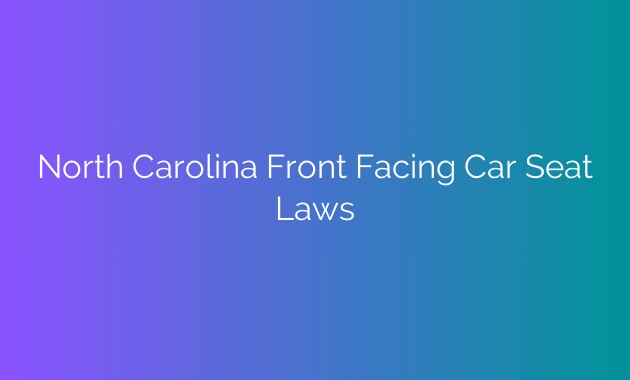Contents
North Carolina Front Facing Car Seat Laws
When it comes to the safety of our children, understanding the car seat laws in North Carolina is crucial. These laws are in place to ensure that children are protected while traveling in a vehicle. One specific area of focus is the use of front facing car seats. In this article, we will dive into the details of North Carolina front facing car seat laws, providing you with the most accurate and detailed information available.
Understanding the Requirements
In North Carolina, the law requires that children under the age of eight and weighing less than 80 pounds must be secured in a car seat or booster seat appropriate for their age, weight, and height. When it comes to front facing car seats, there are additional specifications that must be followed.
First and foremost, infants and toddlers under the age of two and weighing less than 20 pounds must be positioned in a rear-facing car seat. This is important as it provides optimal protection for their fragile bodies.
Once a child reaches the age of two or exceeds the weight and height limits for a rear-facing seat, they can transition to a front facing car seat. The seat should be installed in the back seat of the vehicle and secured according to the manufacturer’s instructions.
Proper Installation and Usage
Installing a front facing car seat correctly is crucial to ensure maximum safety. It is recommended to carefully read the instruction manual provided by the car seat manufacturer. This will guide you through the installation process and highlight any specific requirements.
When installing the car seat, make sure it is tightly secured and doesn’t move more than an inch in any direction. The harness straps should be adjusted to fit snugly against the child’s body, with the chest clip positioned at armpit level. It’s important to note that bulky clothing, such as winter coats, should be removed before buckling the child into the seat to maintain a secure fit.
Exceptions to the Law
There are a few exceptions to the front facing car seat laws in North Carolina. If a child meets certain medical or developmental criteria that make it impractical or unsafe to use a car seat or booster seat, they may be exempt from the requirement. However, a written statement from a physician must be obtained and kept in the vehicle at all times.
Additionally, if all rear seats in the vehicle are occupied by other children under the age of eight and weighing less than 80 pounds, a child may be placed in a front seat secured by a seat belt. However, this should only be done as a last resort when all other seating options are unavailable.
Enforcement and Penalties
The North Carolina front facing car seat laws are enforced by law enforcement officers. If a violation is observed, the officer has the authority to issue a citation to the driver. The penalties for non-compliance with the car seat laws can vary, ranging from fines to even court appearances.
It is important to note that these laws are in place to protect the safety and well-being of our children. By following the guidelines and ensuring proper usage of car seats, we can greatly reduce the risk of injuries in the event of an accident.
Conclusion

Understanding and complying with the North Carolina front facing car seat laws is essential for the safety of our children. By properly installing and using front facing car seats, we can provide the necessary protection during travel. Remember to consult the car seat manufacturer’s instructions for specific installation details and always prioritize the safety of your child.
Frequently Asked Questions
Q1: Are front facing car seats required in North Carolina?
A1: Yes, front facing car seats are required in North Carolina for children who have outgrown rear-facing seats.
Q2: Can I place my child in the front seat if all rear seats are occupied?
A2: In limited circumstances, if all rear seats are occupied by children under the age of eight and weighing less than 80 pounds, a child may be placed in a front seat secured by a seat belt.
Q3: What are the penalties for not complying with front facing car seat laws?
A3: Penalties for non-compliance can vary, including fines and potential court appearances.
Q4: Are there any exceptions to the front facing car seat laws?
A4: Yes, exceptions may apply for children who meet certain medical or developmental criteria, but a written statement from a physician is required.
Q5: What is the purpose of front facing car seat laws?
A5: The purpose of these laws is to ensure the safety and protection of children while traveling in a vehicle, reducing the risk of injuries in the event of an accident.
